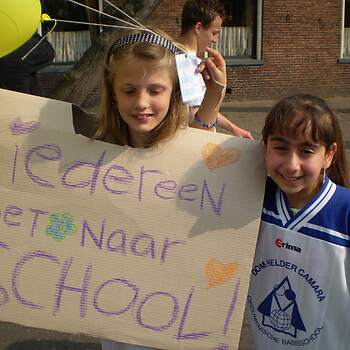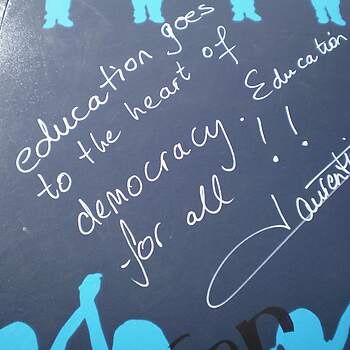From 1999–2009, globally, the Netherlands was the fourth-largest donor, having a long-term financial commitment to support basic education. In this period, total Dutch aid for basic education amounted to more than €3.5 billion – an average of €350 million a year. A sharp increase in expenditure on basic education occurred around 2001, in response to the government’s target of spending 15% of overall development assistance (ODA) on (basic) education.
But the Netherlands did not just provide financial resources. The portfolio also included support for monitoring progress in the sector through research and international data collection and analysis by institutes related to UNESCO. The Netherlands has also been the co-initiator of particularly innovative global initiatives such as the Fast Track Initiative (FTI) and UNICEF’s Education in Emergencies and Post-Crisis Transition (EEPCT) programme.
In all education partner countries, the Dutch support to education included support through NGOs and multilateral organizations. This two-pronged approach proved complementary to the support of governments.
The Netherlands did not only contribute with financial resources, it also invested in human resources (such as education advisors) as well as in research and knowledge sharing. In all countries evaluated by the IOB, the embassies included teams of experienced education experts that were made up of both Dutch and local staff. Also, in some countries, the Netherlands provided support for technical assistance.
An overview of support to basic education over the years, channelled in terms of funding/financial expenditure from the Netherlands to education partner countries through:
- bilateral aid – 55%
- delegated bilateral expenditure: this can be traced to specific countries, in particular, support provided via embassies in partner countries;
- central bilateral expenditure: this is provided through the Netherlands’ Ministry headquarters in The Hague;
- most funding (55%) was provided through the bilateral channel, which is in line with the policy that is “geared in the first instance to supporting governments in their efforts to implement national educational reform programmes”. However, a newer trend is visible to increase support to larger Partnerships via tendering procedures.
- multilateral aid – 29%
- through multilateral organizations, global initiatives and networks on both the global level and in individual countries, where they can interact with, and complement bilateral education programmes in education partner countries (EPCs);
- a substantial share of multilateral funding passes through: the FTI, UNICEF, the World Bank and the European Commission:
- Education for All’s Fast Track Initiative (FTI): launched in 2002 with the aim of achieving universal quality education; The Netherlands has very close involvement in the programme.
- UNESCO: in addition to the core contributions to UNESCO, the Netherlands provides voluntary, extra-budgetary funding to institutes related to UNESCO for the generation of information and knowledge.
- UNICEF’s Education in Emergencies and Post-Crisis Transition (EEPCT) programme: began in 2006 as a four-year partnership between UNICEF and the Dutch Government. With a value of €152 million (2006-2010), it is the biggest single grant ever donated to UNICEF. Additional support of €4 million was provided later by the European Commission and a fifth-year was added to the programme.
- World Bank: Dutch support for the World Bank’s education programme was provided as International Development Association (IDA) core funding and through the Bank Netherlands Partnership Programme (BNPP), a multi-donor trust fund for capacity building.
- The European Commission: The Netherlands contributes to European Union (EU) development cooperation, executed by the European Commission (EC), in two ways:
- through the inter-governmental European Development Fund (EDF), in which case the contribution is reflected in the budget of the Ministry
- as part of its contribution to the EU budget.
- According to the Ministry’s financial department, 4-5% of EU funding is allocated to basic education.
- International networks: the Netherlands funds various international networks:
- The Association for the Development of Education in Africa (ADEA)
- The International Working Group on Education (IWGE)
- The Interagency Network on Education in Emergencies (INEE)
- The Forum for African Women Educationalists (FAWE)
- civil society expenditure/support for (I)NGOs – 13%
- Although this has been key, it has lesser importance. The Dutch policy on education explicitly calls for cooperation between governments and civil society organizations (CSOs) among which NGOs. Local and Dutch NGOs can be supported through Dutch embassies in partner countries. In addition, several (Dutch) NGOs received co-financing support from the Ministry. The largest education programmes are implemented by:
- Edukans
- ICCO
- Oxfam Novib
- Plan Netherlands
- Terre des Hommes
- Although this has been key, it has lesser importance. The Dutch policy on education explicitly calls for cooperation between governments and civil society organizations (CSOs) among which NGOs. Local and Dutch NGOs can be supported through Dutch embassies in partner countries. In addition, several (Dutch) NGOs received co-financing support from the Ministry. The largest education programmes are implemented by:
Why support (I)NGOs?
Added-value of working with NGOs at country level:
- To develop innovative, alternative interventions with the aim of improving access to education, education quality and the relevance of education, specifically in relation to hard-to-reach target groups;
- To use the experience of NGOs with grass-roots participation of parents and communities;
- To build the capacity of local actors such as teachers, governments and unions;
- To generate political and public support for education reforms through dialogue with governments in partner countries and through lobby and advocacy.
Added-value of working through Dutch NGOs as intermediaries:
- To strengthen civil society in developing countries on equal terms;
- To generate public support and involvement with development cooperation in the Netherlands;
- To improve the complementarity of the bilateral and civil society channels (e.g., through cooperation with embassies).
In general, the development cooperation budget is growing less. The trend towards the type of programs to be funded tends to fund larger programs through e.g., tendering procedures. Expertise in education is phasing out. Currently, the landscape seems to have become more fragmented, with implementing partners competing for funding.
Higher Education support through NUFFIC
A separate channel to support higher education and capacity development is the financing of NUFFIC. Bursaries and scholarships to study in the Netherlands and abroad are provided through the “Orange Knowledge Fund”, administered independently by NUFFIC. This initiative originated in the Eighties by the lobby of universities in the Netherlands and was effectuated under the then Minister for development cooperation H.E. Jan Pronk.
Education support in conflict and crisis situations
Education has been a key focus of support in conflict- and crisis-affected countries. The main regions covered are the Middle East, the Sahel region, the Horn of Africa, the North of Africa, and Asia and South-East Asia (ASEAN).
The following countries receive Dutch support for SDGs, including Education:
- Afghanistan (NB. unclear after the Taliban take-over)
- Burundi
- Burkina Faso
- Ethiopia
- South Sudan
- Mali
- Niger
- Uganda
- Yemen
- Palestinian Authority

